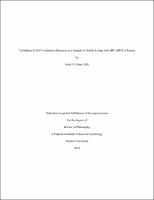Please use this identifier to cite or link to this item:
https://hdl.handle.net/20.500.12202/8418| Title: | Validation of self-evaluation measures in a sample of adults living with HIV/AIDS in Kenya |
| Authors: | Weinberger, Andrea H Shuter, Jonathan Seng, Elizabeth K. Cohen, Julia F. |
| Keywords: | Clinical psychology HIV/AIDS locus of control self-concept self-efficacy smoking smoking cessation |
| Issue Date: | 22-Jul-2022 |
| Publisher: | Yeshiva University |
| Citation: | Cohen, J.F. (2022). Validation of self-evaluation measures in a sample of adults living with HIV/AIDS in Kenya (Publication No. 29395227) [Doctoral dissertation, Yeshiva University]. PDTG. |
| Series/Report no.: | Ferkauf Doctoral Dissertations;Publication No. 29395227 |
| Abstract: | Introduction. Smoking rates have increased in developing countries, such as Kenya, due to geopolitical factors related to the tobacco industry. As a result, clinicians are increasing their efforts to provide smoking cessation interventions. The present study is a secondary analysis of data from a parent study examining the effectiveness of bupropion among people living with HIV/AIDS (PLWHA) in Kenya. The aims of the study were to analyze the psychometrics of three self-evaluation measures pertaining to smoking (Self-Efficacy/Temptation Scale, Smoker and Abstainer Self-Concept Questionnaire, and a version of the Drinking-Related Locus of Control Scale adapted for smoking) in a sample of PLWHA in Kenya. This study also sought to compare the data from the sample of PLWHA in Kenya to data from a sample of PLWHA in the United States. Finally, this study examined self-evaluations pertaining to smoking in the context of qualitative data taken from focus groups from the parent study. ¶Methods. Participants were 50 PLWHA who smoke cigarettes recruited from HIV care clinics and methadone clinics in Nairobi, Kenya (68% male, 96% African). Participants completed measures of self-efficacy (adaptation of the Self-Efficacy Questionnaire, SE), self-concept (Smoker and Abstainer Self-Concept Questionnaire, SC), and locus of control (adaptation of the Drinking-Related Locus of Control Scale, LOC). Factor loadings were determined using Horn’s parallel analysis and factor analysis, and reliability coefficients were calculated. Additionally, results from demographics and self-evaluation measures from the sample in Kenya were compared with a sample from the Bronx, New York, who completed the same measures, using chi-square tests and t-tests. Finally, qualitative data was drawn from three focus groups using a different subset of participants in the parent study in Kenya (total N = 24), which were transcribed and coders examined themes that arose in the focus groups, including HIV, tobacco use, addiction, mental health, and social/interpersonal problems. Coded transcripts were inputted into NVivo and queries were run to examine frequency of themes and interrater reliability. Results. The internal consistency reliability for the self-efficacy (α=0.85) and locus of control (α=0.85) measures were high and were lower for the self-concept measure (overall α=0.43, smoker SC α=0.78, abstainer SC α=0.57). The self-efficacy questionnaire was found to have a three-factor solution accounting for 51.2% of the overall variance similar to the three factors found in previous research. The self-concept measure was found to have a three-factor solution accounting for 65.49% of the overall variance which includes an overall smoker self-concept factor and two abstainer self-concept factors. The locus of control questionnaire was found to have an eight-factor solution accounting for 69.75% of the overall variance, which differed from the three-factor solution found in previous research. Compared with PLWHA in the Bronx, the PLWHA in Kenya had a higher total mean score for self-efficacy (p = 0.07), higher levels of identification as abstainers, higher levels of external locus of control and fate/chance, and lower levels of internal locus of control. Qualitative data analysis showed that participants with PLWHA in Kenya had high motivation to quit smoking but were frustrated in their difficulty quitting, citing challenges with addiction and cravings.¶Conclusions. Together, the results showed that while the psychometrics of the self-efficacy and self-concept scales for the Kenya sample of PLWHA had similar findings to previous analyses that took place in developed countries, the locus of control measure had very different results, highlighting the importance of examining cultural experiences as part of analyzing psychometrics for self-report measures. Understanding how people view smoking while taking into account cultural and individual differences may help clinicians develop smoking cessation interventions for PLWHA that target these views and self-evaluations. |
| Description: | Doctoral dissertation, PhD / Open Access |
| URI: | https://hdl.handle.net/20.500.12202/8418 https://ezproxy.yu.edu/login?url=https://www.proquest.com/dissertations-theses/validation-self-evaluation-measures-sample-adults/docview/2721764648/se-2?accountid=15178 |
| ISBN: | 9798351444789 |
| Appears in Collections: | Ferkauf Graduate School of Psychology: Doctoral Dissertations |
Files in This Item:
| File | Description | Size | Format | |
|---|---|---|---|---|
| JuliaCohenDissertation7.22.2022 OA.pdf | 1.36 MB | Adobe PDF |  View/Open |
This item is licensed under a Creative Commons License

